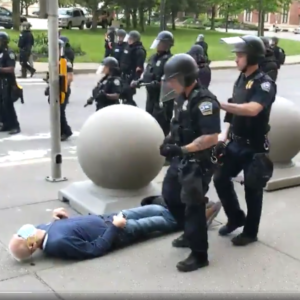The police misconduct issue that sent thousands of protesters on to the streets of New Hampshire this weekend will be waiting for the state legislature when it reconvenes this week. And so will representatives of the state’s influential law enforcement unions, who oppose the most significant police reform measure under consideration in this COVID-19 shortened session.
The Senate’s calendar includes a proposal sponsored by Rep. John Burt (R-Goffstown), and overwhelmingly passed by the House in March, that would require police officers to report any misconduct committed by their fellow cops to the chief law enforcement officer in their department. That officer would then be mandated to report it to the New Hampshire Police Standards and Training Council.
“I’ve been trying to get this passed for about six years,” Burt told NHJournal. “I’m very optimistic based on what I’m hearing from both sides in the Senate.”
At his COVID-19 presser on Friday, Gov. Chris Sununu offered qualified support for the measure. “I’ve seen the first draft of the legislation and it’s all on the right path, it really is.”
Sununu also said the issue is bigger than bad behavior by police.
“It’s not just a law enforcement issue. It’s our culture that really needs to wake up. And it’s unfortunate that it takes the murder of some of these individuals to get us to move forward.”
Perhaps. But it will be law enforcement and their unions who will be pressuring Sununu to veto the legislation if it makes it to his desk.
“The police were against this bill. They say they already look at all these issues — which they don’t. They say it’s a bill in search of a problem. We don’t have a problem?” Burt asked.
How will Sununu respond to pressure from police unions to kill this proposal?
Sununu has enjoyed the support of key law enforcement groups in the past. For example, after backing Democrat Colin Van Ostern in 2016, the New Hampshire Police Association reversed course and backed Sununu in 2018 over Democrat Molly Kelly. Sununu also had the backing of the N.H. Troopers Association in 2018.
One of Sununu’s potential Democratic opponents, Executive Councilor Andru Volinsky, has given the legislation his full-throated support.
“HB 1217 requires that police make a report if they witness misconduct from other officers. The bill has passed the House and is now in the Senate. NH urgently needs to improve police accountability — the Senate must make this bill a priority,” Volinsky tweeted.
And on Monday, state Sen. Dan Feltes, the other Democrat in the gubernatorial primary, told NHJournal he supports Burt’s bill, too.
In a statement on its website in response to the death of George Floyd, Charlie Dennis, president of the New Hampshire Association of Chiefs of Police writes: “In New Hampshire, we work hard to maintain the trust and confidence of the public we serve by demonstrating transparency, accountability and responsibility, to make our communities a better place for all.”
However, the police chiefs opposed Burt’s bill, as well as allowing the Laurie List — a list of police officers with credibility problems — to be released to the public. Hardly actions designed to promote transparency and accountability, notes Burt.
“I see the two Buffalo, NY police being charged with a felony for cracking a 75-year-old man’s head on the cement sidewalk. This makes me think of the six New Hampshire police officers who called me when I introduced HB 1217 and thanked me. They also told me they feared for their jobs if they testified in favor of it because of opposition among the Chiefs of Police and the unions,” Burt said.
“I think if this bill becomes law, it will allow the great police officers we have who truly care about their job to report the few actions of misconducts they see.”
The N.H. State Senate is schedule to meet on Tuesday, June 16.

